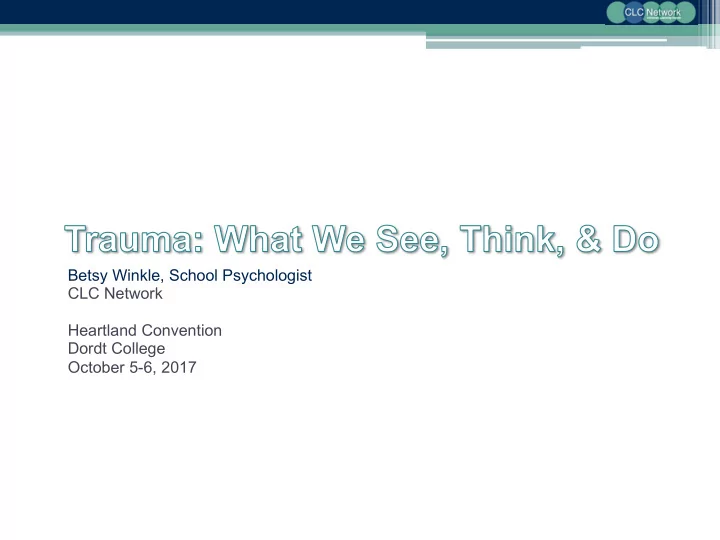

Betsy Winkle, School Psychologist CLC Network Heartland Convention Dordt College October 5-6, 2017
What is Trauma? • An exceptional experience in which powerful and dangerous events overwhelm a person’s capacity to cope. (Souers & Hall, 2016, p15) • Complex trauma occurs when an individual experiences multiple adversities over his or her lifetime TRAUMA
Trauma: Adverse Childhood Experiences • The relationship between children’s emotional experiences (before age 18) and subsequent mental and physical health problems. • 1:2 participants experienced at least 1 ACE • 1:4 participants experienced multiple ACEs • 1:16 experienced 4 or more ACEs
Trauma in the Classroom
What do we see? Flight Fight Freeze • Withdrawing • Acting out • Appearing numb • Leaving the Room • Aggressive • Refusing to answer • Skipping class • Acting silly • Refusing to get needs • Daydreaming • Defiant met • Sleeping • Hyperactive • Staring blankly • Avoiding • Arguing • Appearing unable to classmates/teachers • Screaming/yelling move or act • Hiding • Disengaged
What do we see? • Emotion Regulation • Cognition ▫ Trouble calming down strong ▫ Learning difficulties emotions ▫ Difficulties with problem ▫ Difficulties naming and solving (frustration tolerance) understanding the emotions ▫ Challenges with memory of self or others ▫ Difficulty with organization ▫ Disproportionate emotional ▫ Perfectionism response to an event ▫ Edgy-emotions always close to the surface
What do we see? • Social Relationships • Physical Impact ▫ Difficulty forming and keeping ▫ Hypervigilance: heightened relationships sense of changes in environment ▫ Unable to read social cues ▫ Poor sense of attunement: ▫ Difficult to take others don’t trust bodily senses perspective (hungry, tired) ▫ Frequent illness, obesity, asthma, and speech problems
The Biology of Trauma
Brain Response to Chronic Stress and Trauma
The Thinking Brain vs. The Doing Brain • Thinking Brain: Prefrontal Cortex • Designed to think, reason, and maintain flexibility flexibility • Doing Brain: Limbic Area • Designed for survival • Controls arousal, emotion, and stress response • Smoke Detector: Amygdala • Flips from Thinking Brain to Doing Brain • When students are in a state of stress, they are in their Doing Brain
Emotional Keyboard Taught Hard-Wired Taught • Humility • Sadness • Sympathy • Forgiveness • Joy • Patience • Empathy • Disgust • Shame • Optimism • Anger • Cooperation • Compassion • Surprise • Gratitude • Fear
Relationships Matter! • The effects of trauma can be offset by the presence of one dependable and caring adult (Paper Tigers, 2015).
Shifting Understanding: Looking at Behavior through the Trauma Lens • Behavior as an adaptation, not a choice ▫ Behaviors have become a natural response because of trauma events ▫ More reactive, alarm system easily triggered ▫ Hyper-vigilant ▫ Don’t know how to manage emotions ▫ Difficult time reasoning ▫ Challenge understanding and responding to social cues ▫ Need to be in control because adults have not been reliable
Immediate Response: Primary goal is to reduce student stress • Manage your own stress response • Soften your voice, facial expressions, posture, and body language • Practice skills that settle or release energy • Co-regulate students behavior if student is not able to calm themselves independently • Student will borrow your calm nervous system
Short-Term Response: Skill Building • Help create healthy neural pathways (dirt-track) ▫ Research indicates that new pathways can be built to self-regulate and self-soothe • Model healthy coping strategies • Practice the correct response • Teach emotional range: model, encourage, and reinforce identification and use of complex emotions
Short-Term Response: Adapt the Environment • Greet students at the door (take temperature) • Be consistent and predictable • Communicate and prepare for routine changes • Identify and reduce stressors • Create a quiet, safe place • Allow opportunities for appropriate choice • Increase home-school communication
Restorative Justice & Restorative Circles ▫ Use as a model for discipline ▫ Can be used to solve problems: individual incidents or ongoing behavior ▫ Seek to elicit the story of what happened, associated thoughts and feelings, and solutions for making it right ▫ Non-blaming and judgmental questions ▫ Also can be proactive : create classroom culture, ownership, trust, responsibility, equality, and connection
Long-Term Response: Increase Understanding & Care of Staff • Debrief after significant trauma events • Develop common school language for calming and coping strategies • Pray, with and for each other. • Stay current in the growing research regarding the impact of trauma and the resilience of students.
Discussion
Resources: • ACEs survey: http://www.ncjfcj.org/sites/default/files/Finding%20Your%20ACE%20Score.pdf • TED Talk: Nadine Harris Burke: • https://www.ted.com/talks/nadine_burke_harris_how_childhood_trauma_affects_health_across_a _lifetime • Hand Model of the Brain (Dr. Dan Seigel): • https://www.youtube.com/watch?v=gm9CIJ74Oxw • As Real As It Gets, Amanda Barton and Natalie Hart, Joel Schoon-Tanis (Children’s Book) • Fostering Resilient Learners: Strategies for Creating A Trauma-Sensitive Classroom, Kristin Souers with Pete Hall • The Little Book of Restorative Justice for Schools: Teacher Responsibility; Creating Caring Climates, Lorraine Stutzman Amstutz and Judy H. Mullet • Childhood Disrupted: How Your Biography Becomes Your Biology, and How You Can Heal, Donna Jackson Nakazawa • Teaching with Poverty in Mind: What Being Poor Does to Kids’ Brains and What Schools Can Do About It, Eric Jensen • Restorative Circles In Schools: Building Community and Enhancing Learning, Bob Costello, Joshua Wachtel & Ted Wachtel • Lost at School, Ross Greene
Recommend
More recommend